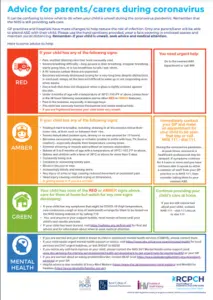Most children and teenagers do not become seriously ill with COVID-19, but doctors have seen a very small number of patients with an unusual condition which seems to be linked to the virus. Paediatric Multisystem Inflammatory Syndrome temporally associated with SARS-CoV-2 (PIMS-TS) is very rare; it occurs in less than 0.05% of children with COVID-19. Most children with the condition will not be seriously affected but, in some cases, it can be serious.
This news story has been written in collaboration with Dr Sanjay Patel (paediatric infectious disease and immunology consultant – Southampton Children’s Hospital) to raise awareness of this condition and provide some helpful links to trusted sources of information to support you in your work with families.
Signs and Symptoms of PIMS-TS:
- fever, which persists over several days
- there’s a very wide range of other symptoms that children might have, including abdominal pain, diarrhoea, vomiting, rash, cold hands/feet and red eyes. These symptoms can be found in other illnesses too.
Children and young people who are seriously affected will have symptoms which are very similar to other life-threatening conditions such as sepsis or meningitis. Some of the symptoms of PIMS-TS can overlap with other rare conditions, such as Kawasaki disease and Toxic Shock Syndrome. Kawasaki disease tends to affect children under five, whereas PIMS seems to affect older children and teenagers.
While most children won’t be seriously unwell, some children may be severely affected by the syndrome. Experts advise, the most important thing is to remember that any child who is seriously unwell needs to be treated quickly – whatever the illness.
Laura is mother to Oliver, and she is raising awareness of PIMS and the symptoms to look out for:
| “Oliver tested positive for Covid with no symptoms in March. Four weeks later, he lost his appetite, became lethargic and developed tummy pains. I took him to A&E, where he was diagnosed with tonsillitis and sent home. Over the next few days, Oliver developed a persistently high temperature, a blotchy rash, swelling, deep red lips, palms and eyelids and bloodshot eyes and was admitted to hospital. Oliver’s blood pressure kept dropping and his heart function was deteriorating so he was transferred to the paediatric intensive care unit. Oliver was then diagnosed with PIMS-TS. Thankfully, Oliver has made a good recovery after 5 days in ICU and 2 weeks in hospital, we were able to return home. There appears to be no long-term heart damage, although he still needs regular heart check-ups”.
(Shared with permission from Laura) |
Children from all ethnic minority backgrounds have been affected by PIMS. A greater proportion of children from Black and Asian backgrounds appear to be affected by PIMS-TS, although it is still not clear what the reason for this is. Nonetheless, it is important for families from all ethnic backgrounds to be aware of the signs and symptoms of the condition, however rare.
Dr Sanjay Patel said:
“The good news is that effective treatments are readily available for treating PIMS-TS and the vast majority of children make an excellent recovery.”
The Royal College of Paediatrics and Child Health has developed a series of posters and information for parents and young people to help explain when and how to seek medical help for their child:
- www.rcpch.ac.uk/coronavirus-posters
- https://www.rcpch.ac.uk/resources/pims-covid-19-linked-syndrome-affecting-children-information-families
Further information and answers to commonly asked questions can be found on the Healthier Together website for parents and professionals:


